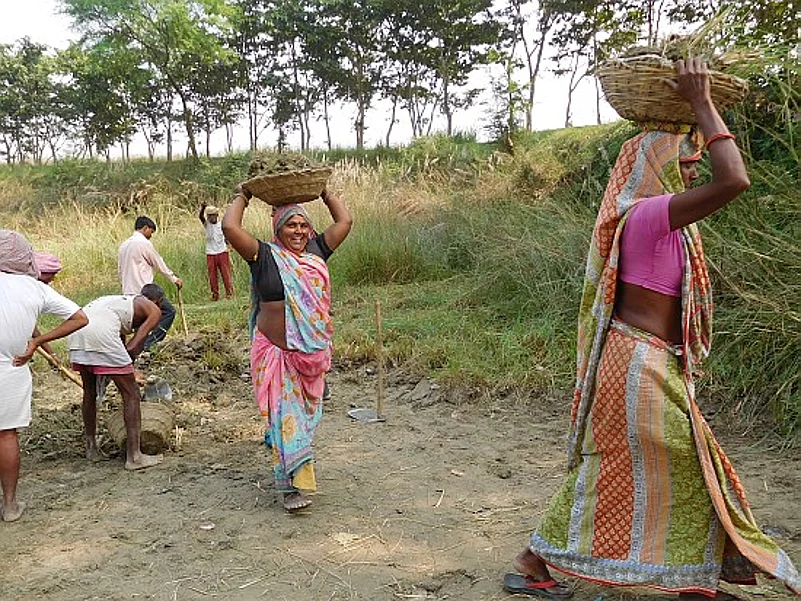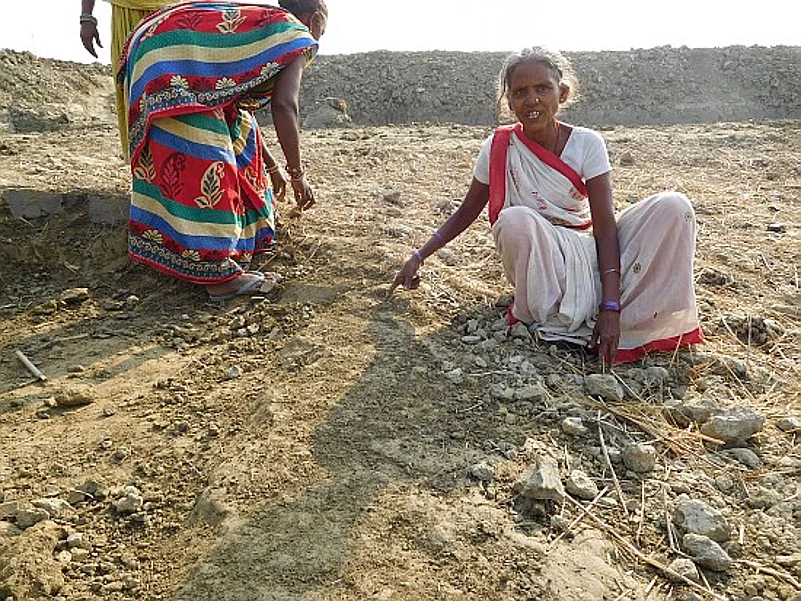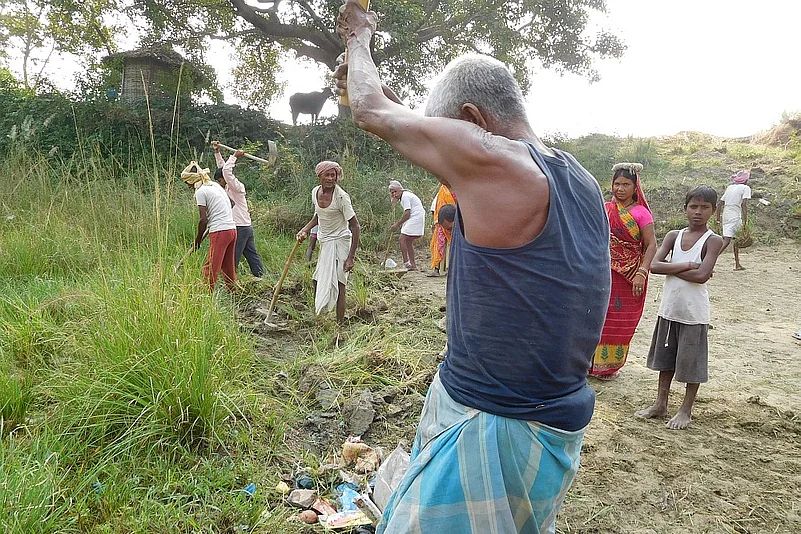This Diwali was special. Even as middle class India celebrated, partied and gambled, a committed group of NREGA labourers in Bihar – worked all day with pickaxe and spade. Their salaried supervisor, the village rozgar sevak, was also on holiday. But undeterred the workers dug deep.
With the sweat of their brow, they found Laxmi – the Goddesses of wealth – both literally and figuratively.

On Diwali day, Pavithra Paswan, 67, a committed NREGA worker found an idol of Goddess Laxmi as he dug a pond on a worksite in Muzaffarpur’s Natrauli village. Photo Credit: Swati Narayan
Pavithra Paswan squealed in delight as his spade struck an idol of the goddess buried in the grassy overgrowth. “Take a photo,” he demanded, “this is wonderful.” On this auspicious day, this motley crew also earned Rs 177 for a full day of backbreaking work. Everyday is precious for a daily wager. Besides these were the fruits of a particularly hard-won struggle.
Advertisement
NREGA workers unite
The National Rural Employment Guarantee Act 2005 is a product of a long people’s movement. A decade after its enactment, these pioneering workers in Bihar are amongst the few in the country to form their own association. The Samaj Parivartan Shakti Sanghatan (SPSS) is a peoples’ movement to demand entitlements.
Two years ago, they had declared a “Black Diwali.” In 2014, they did not receive a single day of work. They had also protested for 32 days, as their wages had not been paid for more than six months.

NREGA workers of the Samaj Pragati Shakti Sanghatan marking “Black Diwali” outside the Panchayat officinMuzaffarpur in 2014. Activist Jean Drèze had joined them in solidarity. Photo Credit: Sanjay Sahni
Advertisement
This year, too they sat on another 52-day dharna. The situation of joblessness and distress migration was particularly grim. The recent startling revelations of the central government’s use of a Whatsapp group to subvert the law explain why their entitlements mystifyingly dried up.

NREGA workers of the Samaj Pragati Shakti Sanghatan on a 42-day dharna in August-September 2016 outside the Muzaffarpur district office demanding work and wages. Photo Credit: Sanjay Sahni
Rays of Light
Then on Dhanteras, the first day of Diwali, to their delight the rozgar sevak announced that NREGA work would be re-started. This announcement was out of the blue. Despite the ongoing harvest and festivities, perhaps triggered to quell the rising tide of nationwide disenchantment.

Dukha Sahni nursing a wound on his leg works on Diwali with his wife Soumitra Devi. Both sexagenarians haven’t received their pension for months Photo Credit: Swati Narayan

NREGA workers delighted to be offered work on Diwali day at a worksite in Muzaffarpur’s Natrauli village. Photo Credit: Swati Narayan
Still, tens of families were disappointed. They went to the designated worksite to construct the pond only to find that their names were not included. But were assured that another muster roll would be prepared within days. Of the 62 workers on the present list, a committed 22 turned up on the auspicious day. Their attendance will swell to full strength, after the festivities.
Advertisement
If they are lucky they will receive a full 100 days this year (though eligible for 150 days as Bihar was drought-affected) for the first time under the groundbreaking NREGA law. This translates into a modest Rs 17,700 each year for the entire family. Every rupee is precious.
Unique movement

Sanjay Sahni, 34, leader of the Samaj Parivartan Shakti Sanghatan, also earns his bread as an NREGA labourer to support his family. Photo Credit: Swati Narayan
What is unique about the SPSS is that every member is a labourer. Even their leader, Sanjay Sahni, 34, earns his bread with his spade to support his family. A former Delhi-based electrician, he stumbled upon corruption in his village NREGA records and returned home to earnestly reverse the tide. He quips, “I feel our [David-Goliath] struggle is like the film ‘Lagaan’ [where a rag-tag team of Indian village folk take on the heartless British bureaucracy] to overcome corruption for our rights."
Advertisement
Each member of SPSS now contributes a precious day’s wages of Rs 177 to run the organization. Unlike other worksites, even the educated “mate” Mandeshwar, 34, doesn’t only mark attendance, but also digs to support his comrades. In the previous elections, he was also elected as a ward member.
Another exceptional feature is that women, of all castes and religions, are at the forefront. Most of them are mothers and grandmothers. They lead the protests, organize roadblocks, travel long distances, cook at dharnas, crack jokes, sing protest songs and play the drum. Wizened Mandeshwari Devi, 63, pragmatically explains, “if NREGA wages are paid on time, then men too who have the primary responsibility of running homes, would have joined us in greater numbers.” Till then, the women are very proud of their NREGA earnings. Some spend it on their families, while many save it for a rainy day.
Advertisement

A regular meeting of the Samaj Parivartan Shakti Sanghatan outside their mud office built by the labourers themselves. Most meetings run late into the night as they strategize their next protest Photo Credit: Swati Narayan
NREGA Watch
The influence of this home-brewed movement is so strong that members proudly display their affiliation. Villages are dotted with flex banners outside homes that read “NREGA Watch.” The movement has now spread to 45 villages in 4 blocks. They want every passerby and the government to know that they are tracking their entitlements with a watchful eye.

Homes in Muzaffarpur block marked “NREGA Watch”. Photo Credit: Swati Narayan
Advertisement
A few days ago, they uncovered another fraud. The mukhiya of a nearby village had hired machines at night to do the work earmarked for labourers. The sanghatan members were unlikely to take this lightly. They did a spontaneous rasta-roko. The District Development Office and other officials had to turn up to assuage them. But there remain markings on the worksite to clearly indicate signs of an attempted cover-up.

Mandeshwari Devi, 63, an active sanghatan member shows signs of machines illegally completing work on an NREGA worksite, to deprive labourers of their rightful wages and entitlements. Photo Credit: Swati Narayan
Advertisement
Beyond NREGA
The SPSS is now taking up other challenges beyond NREGA. The National Food Security Act, 2013 guarantees 5 kilograms of wheat, rice or millets, to two of every three Indians each month. So, they have confronted the local dealer to provide them the full entitlement. In the process they have already unearthed Rs 55 lakhs of fraud. Still, many families have yet to receive their full 12 months of subsidised foodgrain with barcoded coupons.

Kedarnath the ration dealer in Mahant Manyari Panchayat is amused as “NREGA Watch” members inspect his delivery of foodgrains. Photo Credit: Sanjay Sahni
Bihar despite its ten percent economic growth rate is amongst the most backward in the country, in terms of human development. Caste discrimination is rife. Corruption is legendary. More than 40 percent of children are undernourished. Women largely remain indoors.
Advertisement
In the midst of this omnipresent destitution, SPSS is a beacon of hope. Let their light shine bright on the Bihar landscape, this Diwali and beyond.
Swati Narayan is a research scholar at the Tata Institute of Social Sciences.




















